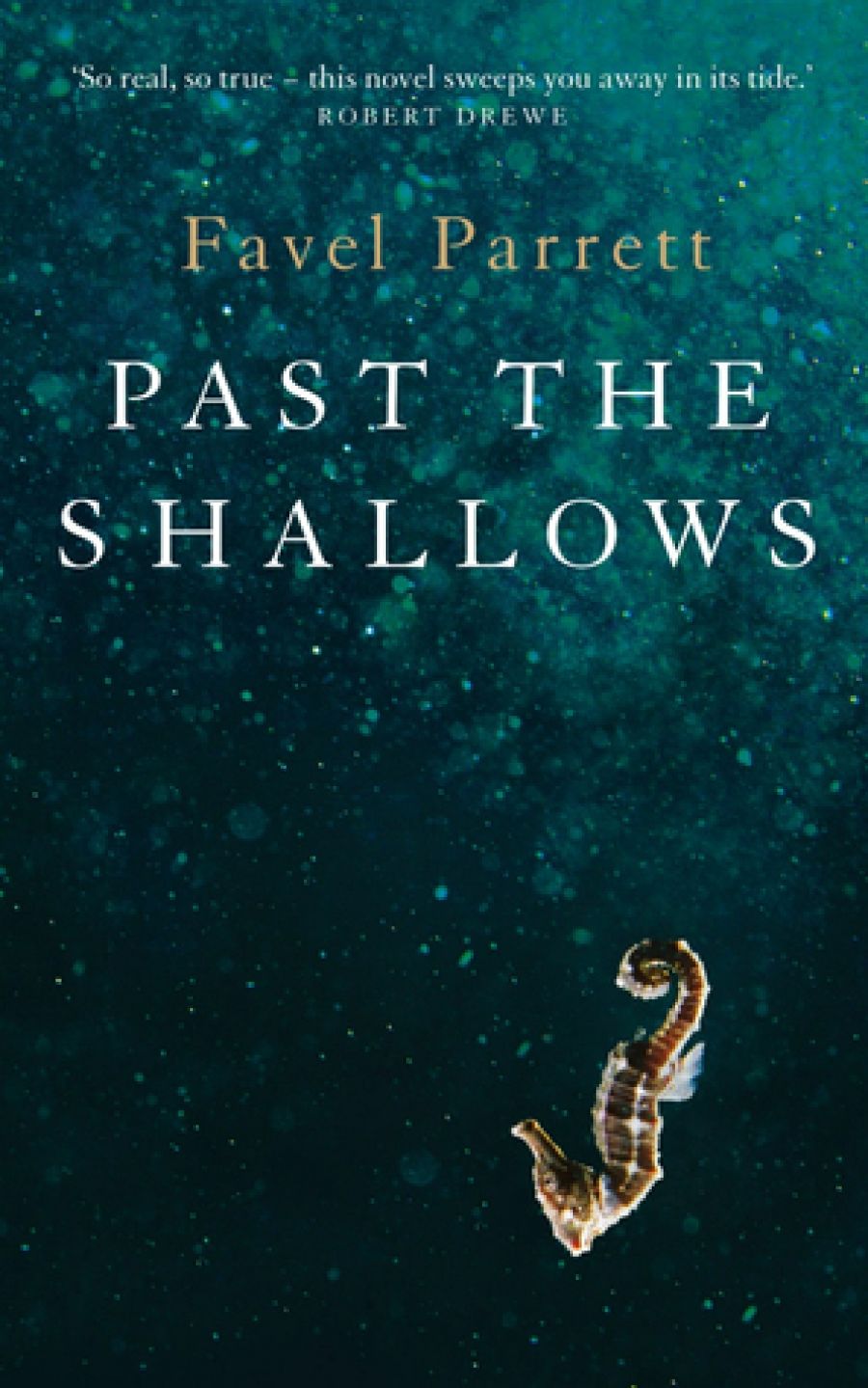
- Free Article: No
- Contents Category: Fiction
- Review Article: Yes
- Online Only: No
- Custom Highlight Text:
The beauty and danger of the ocean and its unpredictable nature have long been fertile subjects for artists and writers, and the sea a popular and potent metaphor. In Favel Parrett’s trim, lyrical début novel Past the Shallows, shortlisted for the Miles Franklin Award,the sea is once again symbolic. In fact, nearly everything in this novel feels symbolic, sometimes distractingly so.
- Book 1 Title: Past the Shallows
- Book 1 Biblio: Hachette Australia, $26.99 pb, 272 pp, 9780733626579
Set on the south coast of Tasmania in 1983, Past the Shallows is told from the interwoven perspectives of two young brothers. Miles and Harry live with their father, a harsh and volatile abalone fisherman. Their Uncle Nick disappeared several years earlier on the same night that their mother died in a car accident. Joe, their older brother, moved out when he was thirteen to live with their grandfather, who dies just before the novel begins. After his death the boys’ widowed aunt successfully contests his will and plans to sell his house, as they ‘could all do with the money’. As a result, the soon-to-be-homeless nineteen-year-old Joe plans to sail away towards the South Pacific in a boat he built himself, leaving Harry and Miles stranded with their increasingly hard-drinking father.
Parrett’s writing is simple and stylish, and the voices of the two boys are distinctive and convincing. Harry’s innocent, puppy-like attitude toward the world is perfectly evoked through a mix of simple declarative sentences and longer ones that tumble over themselves, almost breathless with enthusiasm. The description of him evaluating the different show bags on offer at the Regatta is sweetly authentic. His developing friendship with a reclusive older neighbour is touching and deftly handled, while his preoccupation with food is endearing.
Miles, at thirteen, is deemed old enough to spend his school holidays working on the boat with his father and his crew – the friendly Martin and the psychopathic Jeff. Diving for abalone is a perilous job, and Miles dreads the day when he will have to return to the depths to search in the ‘murky darkness, in the swirling kelp, [where] all you had to guide you was one hand touching the rock wall while your legs kicked you down blind’. His father, increasingly desperate for money, is urged by Jeff to venture further out into protected waters in search of bigger abalone.
Scenes on the boat are coloured by Miles’s awareness of the potential for violence and danger; highlighted early on in a dramatic encounter with a mako shark, which Jeff butchers with disturbing glee. On Miles’s first day working on his father’s boat, he passes the place where he believes his Uncle Nick disappeared: ‘Nick would have been dragged out alone in the dark where the rip ran strongest. And they never found him. Not one bit. Not his beanie. Not his boots. Not his bones. Just the dinghy floating loose, empty and washed clean.’
Past the Shallows is largely concerned with themes of loss and separation, love and obligation, the tantalising natures of memory and freedom, and the fear of losing a sibling. The novel explores the complex bonds of brotherhood and friendship, as well as the rippling inconstancies of time and memory. Miles’s recollections of the car crash in which his mother died are often returned to and elaborated, gathering detail and momentum as the story progresses. These sections are powerful, although the shifts in place and time can be abrupt. Despite the rich detail in Parrett’s descriptions of land and sea, there are strangely few physical descriptions given of the characters in this keenly masculine world.
Parrett’s crystalline prose and her rhythmic sentences give the narrative a wave-like power. Her writing is at its strongest and most vivid when describing the sea, from the peaceful swells at the bluff ‘like liquid mercury’ to the ‘rise and fall of the ocean breathing’ and the ‘snap and roar’ of waves in a storm. However, the undercurrent of symbolism that flows through the text occasionally threatens to overwhelm the writing’s subtlety. There are a few clichéd phrases, and places where descriptions don’t quite work (at one point a freshly picked apple is described as ‘bubbling’). Some allusions and metaphors seem self-conscious. But these are minor concerns. Parrett demonstrates a undeniable flair for language, characterisation, and haunting details; lilies on a kitchen table, the ‘dark cherry red’ of the seats in the boys’ mother’s car, the moment when Harry returns home with his carefully chosen show bags to find Miles holding his blistered hands ‘strangely’ and sits by him, taking ‘small, quiet bites of his chocolate frog’.
Past the Shallows makes an impact. The suffocating chill of seawater remains long after the action in the shocking final section has shifted back to dry land, which is why the extra ‘Reading Group Guide’ that follows the standard author acknowledgment at the end of this edition is particularly jarring. A minor quibble, perhaps, but it seems unfortunate to break the spell of this tense literary novel with ‘Review Raves’ and facile ‘Discussion Points’ such as: ‘The water throughout the novel is a metaphor for Dad. Do you agree or not, and what from the text made you feel this way?’ These sections may have some appeal for students or those running book clubs, but here it adds nothing to the book and instead seems disrespectful to both the reader and the story.


Comments powered by CComment